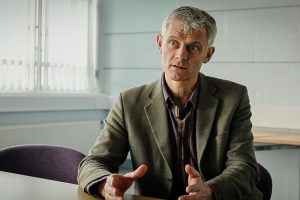Staying Grounded

Kevin Anderson, deputy director of the Tyndall Centre for Climate Change Research at the University of Manchester in Britain, has grounded himself. His self-imposed ban on flying has lasted seven years and counting. Anderson is compelled to lead by example because, like other climatologists, he knows too much about how our carbon-based economy is altering our atmosphere, already raising havoc in many nations and imperiling not-so-distant future generations. Air travel, “the most emission profligate activity per hour” according to Anderson, is almost always optional.
But what about passengers that spend a little extra for their ticket to purchase carbon offsets? These purchases fund projects in the developing world that capture atmospheric carbon through reforestation or reduce emissions through investments in renewable energy projects. Many people concerned with climate change view them as a legitimate way to fly guilt-free to holiday destinations or distant obligations. Not Anderson. His recent commentary in the journal Nature argues that, “[o]ffsetting is worse than doing nothing. It is without scientific legitimacy, is dangerously misleading and almost certainly contributes to a net increase in the absolute rate of global emissions growth.”
Carbon offsets are flawed, argues Anderson, because greenhouse gases remain in the atmosphere for at least a century and offset projects exist within a carbon-driven economy. A legitimate offset project, therefore, must prove that it can remove an amount of greenhouse gases equal to that produced by the airplane flight plus all additional emissions generated by the offset project, both directly and indirectly, for the next 100 years. “To do so,” writes Anderson, “would presume powers of prediction that could have foreseen the Internet and low-cost airlines following from Marconi’s 1901 telegraph and the Wright brothers’ 1903 maiden flight.” His skepticism stems from the tight link between perceived prosperity and fossil fuel consumption espoused by our current economic system. That is, almost invariably offsetting projects boost emissions indirectly in the developing world by generating cash to be spent on cars or other commodities that consume fossil fuels. Anderson clarifies that he is “not opposed to funding those in poorer communities; but again this has nothing to do with offsetting so why refer to it as such?”
Like others who can see that the emperor has no clothes, Anderson has critics. One responder to the Nature commentary, for instance, compared Anderson’s critique to “…saying recycling doesn’t make sense because our first priority should be focusing on not producing waste.” Anderson calls the parallel “meaningless” because “we’re not recycling the CO2 molecules.” He adds that “I am arguing that we are adding more waste; we dump some rubbish into the environment and then pay for others to develop processes by which they also can dump rubbish—overall an increase in total rubbish dumped; no recycling or offsetting in sight—just our conscience salved.”
He offers a straightforward solution: Scrap carbon offsets and avoid flying as much as possible. He directs his message to everyone, including scientists and environmentalists whom he criticizes for attending “international climate jamborees” while failing to connect their long-distance gallivanting with the climate change crisis. “Jump on a plane and you send a signal that says ‘please buy some more aircraft’…‘please build some more airports,’” Anderson quips on his blog. Instead, he invites people to travel “slow and low.” He elaborates: “Traveling slowly forces us to travel much less, be much more selective in what we attend and to endeavor to get more out of those trips we do take. Fewer trips and potentially longer stays: not rocket science, just unpalatable climate change basics.”
Following his own advice, last year Anderson took a slow train to China, traveling from the UK to Shanghai to open a new research center, 10 days out and 11 days back. When asked about the time costs to his busy academic life, he replied that “despite the value of the destination, the journey was the most productive and enjoyable period of my academic career. I wrote a paper on the way out and almost completed another on the return. A slow moving, perfectly comfortable and pleasantly battered carriage was a conducive environment for thinking and research.” Would he do it again? “Yes, and will likely do so to China in the next couple of years or so. That’s the great emissions-benefit of slow travel: It demands we do some things differently. I’ll not go often, but when I do it will be with a program of activities and not for a short presentation.”

